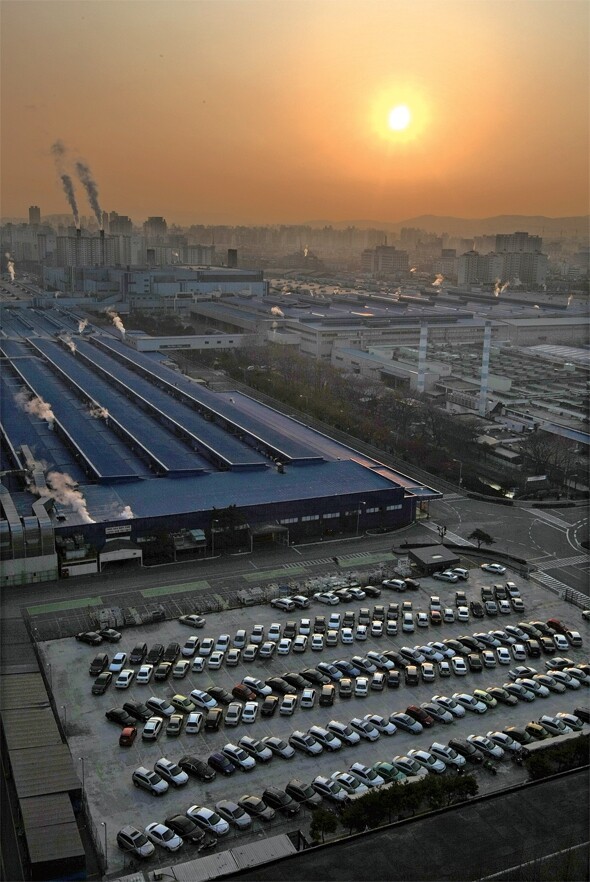hankyoreh
Links to other country sites 다른 나라 사이트 링크
Recalls of American imports seriously hampered by KORUS FTA provision

A toxic provision in the South Korea-US Free Trade Agreement (KORUS FTA) would prevent the South Korean government from implementing a recall even if serious defects threatening driver and passenger safety are found in imported US cars.
The Ministry of Land, Infrastructure and Transport (MOLIT) announced on Nov. 10 that it had requested an authoritative interpretation from the US National Highway Traffic Safety Administration (NHTSA) on whether Impala vehicles imported from the US by GM Korea meet US safety standards after the August discovery of a defect in their tires.
MOLIT previously raised the issue with GM Korea after safety testing with the Automotive Safety Research Center on the Impala showed gaps forming on the sides of the tires. GM Korea declined to take action, claiming the issue was “only found in the sample tires used in testing.” If domestic standards were applied, the ministry would have been able to implement a recall. Instead, it requested confirmation as per KORUS FTA regulations on whether the situation met US safety standards.

The FTA’s regulations on automobiles include quotas allowing imports of up to 25,000 vehicles per business if US safety standards are met – even if the vehicles do not meet South Korean safety standards. The ministry said it had “not yet received an answer from the US.”
Experts said the issue was a matter of the exporting country’s safety standards being applied rather than those of the countries where the vehicles will actually be driven, noting that the different standards adopted for automotive safety are reflections of the countries’ different highway, transportation, and natural environment situations.
“This is a matter of the public’s safety. We can’t judge it in terms of trade interests,” said Daegu University economics professor Kim Yang-hee.
In spite of the situation, the US Secretary of Commerce said in July that the allowance of South Korea exports for only 25,000 vehicles meeting US standards hampered access to the South Korean market for US automakers. The situation hints at a rough road ahead for future KORUS FTA negotiations.
By Choi Jong-hoon, staff reporter
Please direct questions or comments to [english@hani.co.kr]

Editorial・opinion
![[Column] Park Geun-hye déjà vu in Yoon Suk-yeol [Column] Park Geun-hye déjà vu in Yoon Suk-yeol](https://flexible.img.hani.co.kr/flexible/normal/500/300/imgdb/original/2024/0424/651713945113788.jpg) [Column] Park Geun-hye déjà vu in Yoon Suk-yeol
[Column] Park Geun-hye déjà vu in Yoon Suk-yeol![[Editorial] New weight of N. Korea’s nuclear threats makes dialogue all the more urgent [Editorial] New weight of N. Korea’s nuclear threats makes dialogue all the more urgent](https://flexible.img.hani.co.kr/flexible/normal/500/300/imgdb/original/2024/0424/7317139454662664.jpg) [Editorial] New weight of N. Korea’s nuclear threats makes dialogue all the more urgent
[Editorial] New weight of N. Korea’s nuclear threats makes dialogue all the more urgent- [Guest essay] The real reason Korea’s new right wants to dub Rhee a founding father
- [Column] ‘Choson’: Is it time we start referring to N. Korea in its own terms?
- [Editorial] Japan’s rewriting of history with Korea has gone too far
- [Column] The president’s questionable capacity for dialogue
- [Column] Are chaebol firms just pizza pies for families to divvy up as they please?
- [Column] Has Korea, too, crossed the Rubicon on China?
- [Correspondent’s column] In Japan’s alliance with US, echoes of its past alliances with UK
- [Editorial] Does Yoon think the Korean public is wrong?
Most viewed articles
- 1‘We must say no’: Seoul defense chief on Korean, USFK involvement in hypothetical Taiwan crisis
- 2N. Korean delegation’s trip to Iran shows how Pyongyang is leveraging ties with Moscow
- 3‘Weddingflation’ breaks the bank for Korean couples-to-be
- 4[Reportage] On US campuses, student risk arrest as they call for divestment from Israel
- 5Amnesty notes ‘erosion’ of freedom of expression in Korea in annual human rights report
- 6[Column] Park Geun-hye déjà vu in Yoon Suk-yeol
- 7Korea sees more deaths than births for 52nd consecutive month in February
- 8[Editorial] New weight of N. Korea’s nuclear threats makes dialogue all the more urgent
- 9Will NewJeans end up collateral damage in internal feud at K-pop juggernaut Hybe?
- 10[Guest essay] The real reason Korea’s new right wants to dub Rhee a founding father